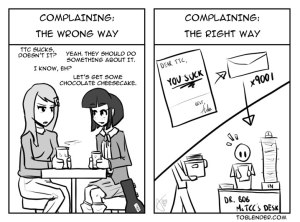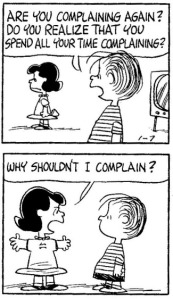How to complain…

The ability to complain effectively really is an art form. Especially in England, when, culturally, we tend to grumble and pick at the food, without actually saying anything about it, and if we do say anything about it, it’s usually at the wrong time. In England, effective complaining is nuanced, subtle, polite and firm.
Maybe it’s because the English are more passive aggressive, and don’t really want to argue, but customers don’t like to complain face to face, and managers are far too apt to just take an item off the bill, then to actually deal with the issue.
So here are my tips on how to complain, get what you asked for, and maybe get a bit off the bill.
1) Complain at the right time.
So first off. You know that point, when your waiter or waitress comes back and asks how everything is? Yes. This is the point when you complain.
This may seem elementary my dear Watson, but really, as a manager, I’ve settled the bill with tables, took away their empty plates, and asked – did you enjoy your meal? And received a complaint then, and when I asked if they were checked back on, they tell me “Yes, they asked me if everything was ok, and I said it was fine, but it was only average, a bit bland.” See how subtle the language is here. As a manager and a waiter, I always ask – are you enjoying your meal?
If you complain when we check back – there are so many options available – and a good waiter or manager will offer them and let you decide.
If a table of two have a meal not up to scratch, in five minutes I can replace both of their meals so they are still eating together, or just one, or get them a different meal if they don’t want to risk the same dish again, I can, although I hate doing it – reheat the food or cook it for longer. I have then fixed the problem.
Then depending on how quickly I get the meal out, how nice the customers are, and how bad the mistake was, I can decide whether, and how much of a discount or free item I can offer. The free thing is a bonus, and makes the customer leave valued, but they have got what they ordered, and experienced what the restaurant intended.
If you get to the end of a meal before complaining, I can only give you something for free, so you still have a rubbish experience. We don’t fix the problem, we are just buying your silence – hoping you won’t complain through head office, or write a bad review online.
Also, there are a lot of customers who are simply trying to get something for nothing – so your waiter and waitress might doubt whether you actually had an issue – especially if your plate is empty, if you wait till the end of the meal.
If you complain nice and early, you are showing some good will to help us to help you have a real dining experience. Which leads me on quite nicely to the next point methinks.
2) Be a part of the solution.
When dealing with a complaint, I like to give the customer options of how we can fix it. If the complaint is really trivial, or really serious, I can sometimes be a bit stumped.
On, what I like to call, the worst Thursday of my life, it was manic busy, we were not staffed for it, as there was a big carol concert happening at the school next door that we knew nothing about. As the manager who is not trained in the kitchen, I got all the drinks and orders in, and looked into the kitchen to see an hour had passed, and a lot of the young participants had been waiting over an hour for their mains, and had to leave for the carol concert in 15 minutes. The kitchen had no way of getting the food out in time. There was literally nothing I could think to do to make the situation better. The shift was out of control and I could not feed these 15 hungry people. I had to ask – how can I make this better?
When complaining, it is ok to say, ‘You have brought out the wrong item for my partner, and I want you to bring out the correct item and mine to be re-made as soon as possible, so we can eat together. If you say it politely, and in a ‘mistakes happen’ sort of manner, the situation will not be awkward, and the manager knows how to rectify the wrong in a way that is suitable for you.
My job when dealing with complaints is to give the customers a bit more than what they deem appropriate, to make them feel valued, without costing the company an arm and a leg in the long run.
Honestly, I have never known anyone to do more than joke about spitting or jizzing in food from less-than-polite diners. As a manager, I know more than anyone that my team make a lot of mistakes, and they are annoyed at themselves, or each other, not the customer when they are made. If you complain nicely, no one is going to bitch about you, or give you strange looks, and no one is going to tamper with your food.
Which is why you need to…
3) Make us want to help you.
Basically, be nice. We are all human beings, we are all just trying to do the best we can, maybe we have had a bad day, maybe you have, mistakes are just dumb mistakes, we are not being malicious – so don’t be either.
We respond well, and give the best service to those who are friendly and polite. We make less mistakes if we are not under pressure or made to feel nervous about aggressive complaints.
Don’t accept sub-par service or food, but just be nice about it. We are all on the same team, trying to make you leave wanting to come back, being well fed and happy enough to tip well.
4) Leave with the situation dealt with.
Don’t write a follow up complaint instead of complaining to the manager on duty.
But, by all means, if they do not react appropriately, write in a complaint, but if the problem can be fixed on the visit, then it should be.

